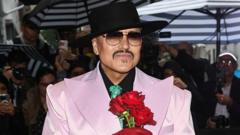The U.S. State Department has taken decisive action against the Mexican band Los Alegres del Barranco, revoking their visas after an incident at a concert where they displayed an image of a notorious drug kingpin, El Mencho, while performing a song that praises him. Deputy Secretary of State Christopher Landau issued a statement highlighting the U.S. government's commitment to restricting access to those who promote criminal behavior, particularly referencing the Trump Administration’s designation of the Jalisco New Generation Cartel (CJNG) as a foreign terrorist organization.
The incident occurred during a performance in Zapopan, Mexico, where the band projected an image of El Mencho—real name Nemesio Oseguera Ramos—on a screen while singing lyrics that romanticize his role as a family man and a "man of war." This concert and the subsequent backlash underscore the challenges faced by authorities in combating the cultural phenomenon of narcocorridos, songs that glorify drug lords and their lifestyles, which have become quite popular among certain audiences in Mexico.
Criticism of the band's actions came not only from U.S. officials but also from Mexican President Claudia Sheinbaum, who expressed her discontent during a press conference, stating, "this shouldn't happen, it's not right," and calling for an investigation into the matter. The ramifications of such performances resonate deeply, especially given the brutal context of drug violence in Mexico, accentuated by reports of abandoned belongings and potential massacre sites associated with cartels.
Los Alegres del Barranco is known for including songs in their repertoire that have previously celebrated drug leaders, including those that reference Joaquín "El Chapo" Guzmán, another infamous figure in the drug trafficking landscape. The ongoing discourse around narcocorridos raises crucial questions about freedom of expression, cultural heritage, and the potential normalization of violence in society.
Against this backdrop, the singer's response to the controversy appeared to embrace the publicity, indicating a complex relationship between art, expression, and accountability in an environment heavily influenced by drug trafficking narratives. As the debate continues, both the impact of the band’s performances and the broader implications for cultural representations of crime will remain at the forefront of discussions on public morality and safety.



















